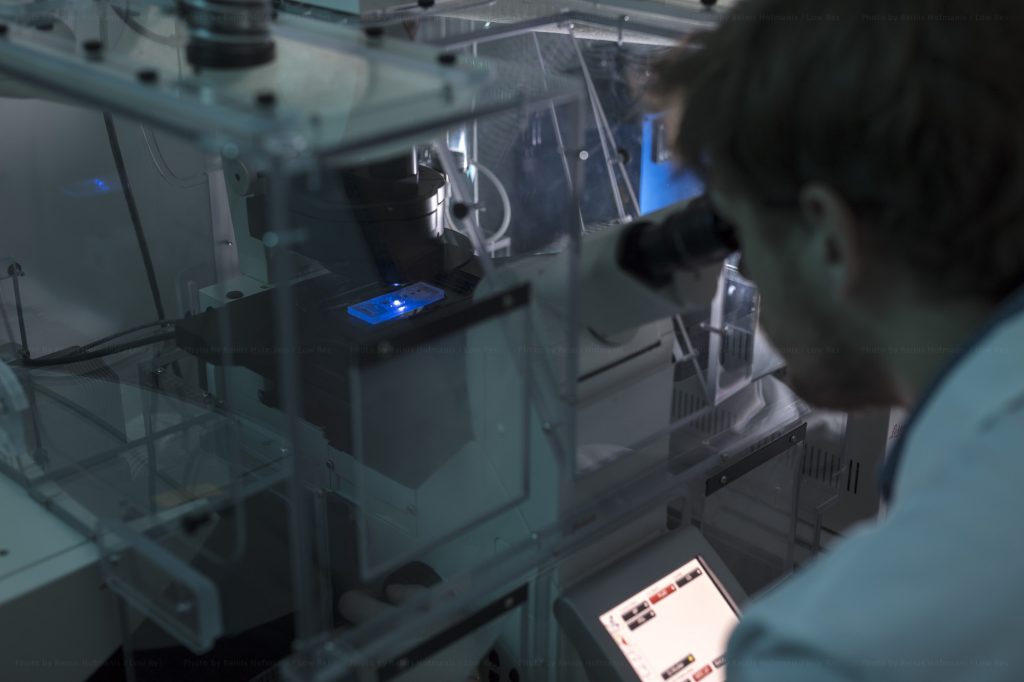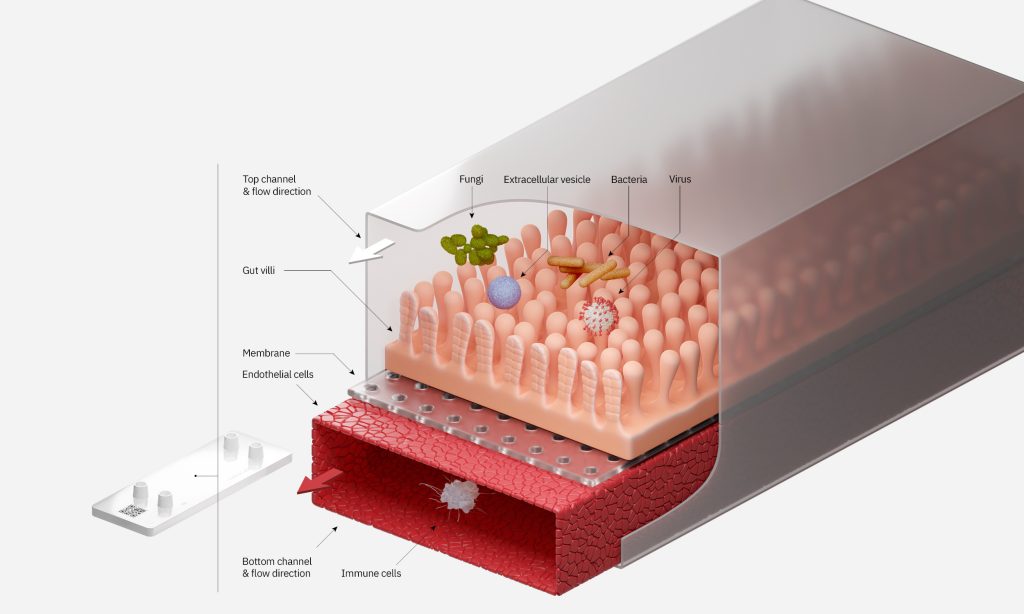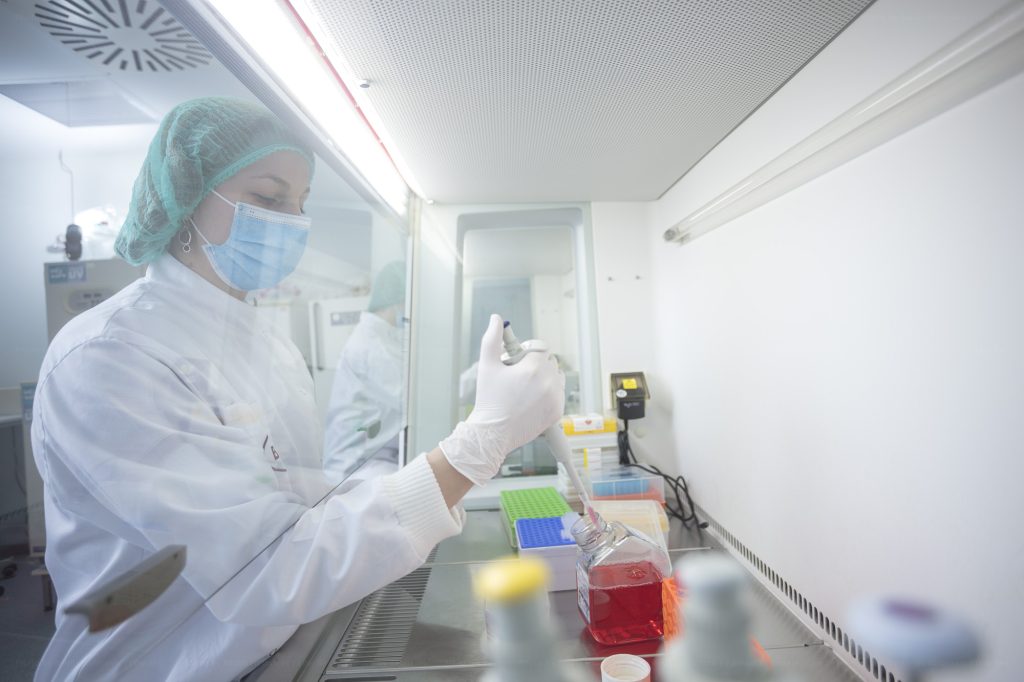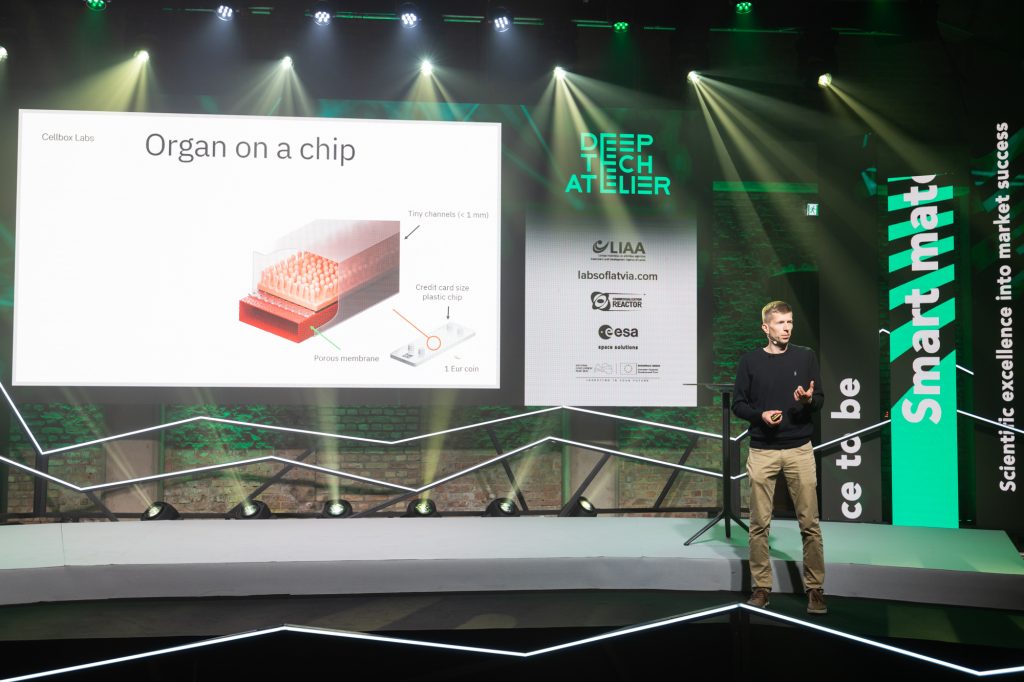
Organs-on-a-chip are small polymer devices with microchannel systems that allow the cultivation of various human cells
As the field of precision medicine is rapidly growing worldwide, Cellbox Labs is a Latvian startup that is on the front lines of developing technology for it.
The innovation dates back to 2019 when one of the co-founders of Cellbox Labs, molecular biologist and cancer researcher Artūrs Ābols, traveled from Latvian Biomedical Research and Study Center to the Institute of Solid State Physics (CFI) with the goal of establishing collaboration with scientists in the field of biomedicine. At that time, Roberts Rimša, a microfluidics specialist, had moved from United Kingdom to Riga and was working in the CFI laboratory led by Gatis Mozoļevskis. The trio decided to work on a joint project, but first, they had to find a common ground for their unique skillsets.
During his postdoctoral research, Artūrs investigated the presence of bacteria small RNA molecules in human blood. Without knowing their origin and role in human health, Artūrs speculated that they might come from the gut microbiota, but at that time, he had no tools or means to further study them.
Microfluidics opened up a new possibility – to create an organ-on-a-chip platform outside the human body to observe the interaction between gut tissues and anaerobic microbiota. “I proposed this problem situation and potential solution to Roberts and Gatis. Luckily, both of them had already heard about this technology, understood that it was a great opportunity to combine our different knowledge, and agreed to start the project,” says Artūrs. The newly formed team immediately began working and applied for accelerators with the idea, winning an award in one of them – the receiving of which required establishing a company, which meant officially becoming Cellbox Labs. “We realized that we could develop this technology better than other competitors on the market at that time, and it has good commercial potential.”

Founders of Cellbox Labs, from the left – Artūrs Ābols, Roberts Rimša, Gatis Mozoļevskis
What is an organ-on-a-chip
Organs-on-a-chip are small polymer devices with microchannel systems that allow the cultivation of various human cells, depending on what tissues are going to be studied. The microchannel system and fluid flow allow for these cells to be in similar conditions to those in the body, accurately mimicking tissue responses to stimuli. Although the name might suggest that a whole organ is on the chip, it’s not the case – the chip is quite small and contains only enough tissue to replicate specific tissue functions.
Chips are primarily used to study the causes and development of diseases, and to test drugs. For example, a researcher from a pharmaceutical company wants to understand how a newly discovered chemical affects intestinal mucus secretion or the intestinal barrier. Organ-on-a-chip allows them to study this dynamically – aggressively testing these substances at various concentrations without harming humans or other living beings. This would also speed up the drug development – increasing availability at a lower cost, making them more accessible to patients.
The sources for cells on the chip vary – stable cell lines from cell banks (which are unfortunately often cultured in the laboratory for so long that they do not always behave similarly to human cells), cells directly from donors, and stem cells converted into the required tissues. Cellbox Labs participates in various projects and collaborates with several Latvian institutes and hospitals, obtaining permission to obtain patient cells from the Central Institutional Ethics Committee. However, Cellbox Labs mainly produces the plastic chip technology itself – if partners want to use them, they must find a source of cells themselves.
This technology has the potential to connect multiple organ tissues on a chip to create a system – an organism-on-a-chip that could simulate how drugs affect a specific person’s body as a whole.

Structure of an organ-on-a-chip
Optimizing cancer treatment
The chips are not the same for all organs, so Cellbox Labs is currently focusing on intestines (where the project originally started) and lungs. The beginning of lung chips came during the Covid-19 pandemic – with the aim of creating a platform that would allow more precise testing or re-profiling of drugs against new respiratory infections in the future. Shortly thereafter, Cellbox Labs began collaborating with the Clinical and Preventive Medicine Institute (KPMI) – planning to grow lung cancers on a chip from tissues obtained during patient surgeries. This would enable testing the effectiveness of cancer therapy before giving the drug to the patient. Looking ahead – the next Cellbox Labs chip could be the blood-brain barrier, as there is a present issue in pharmaceuticals to ensure the delivery of drugs from the circulatory system to the brain.
Precision medicine is a field where the goal is to use the latest technologies and select the most suitable therapy for each patient. For example, a sample of a patient’s cancer tissue is taken, its molecular profile is created, and based on the detected mutations, a targeted therapy is developed. However, even in such situations, it is not possible to fully predict the effectiveness of the drug on cancer cells and its toxicity on lung cells. Physicians need an additional tool to test the therapy – and that could be an organ-on-a-chip. “There are many tumors that respond poorly to drug therapy. Whether a patient receives systemic therapy is decided by a multidisciplinary council of doctors based on the stage of the tumor and its biological characteristics,” says Dr. Kristaps Eglītis from RAKUS Oncosurgery Clinic.
The process of growing and analyzing cells would take from a few weeks to a month (as the technology advances, the speed would increase), but dr. Eglītis emphasizes that even a month would be fast enough. Typically, a breast cancer patient comes to a clinic where a potentially malignant growth is observed in radiological examination and a tissue biopsy is taken. At the same time as the analysis, these tissues could already be sent for cultivation on a chip. If the results of chemotherapy effectiveness on these tissues were known within a month, it would be just in time – if the tumor is in a late stage and surgery is not sufficient, the patient would be receiving preoperative chemotherapy. Even if the chip results were not obtained by then, the patient usually receives postoperative chemotherapy after a month. Until then, it would certainly be possible to thoroughly test various drugs, accurately determining which therapy would benefit the patient the most.
The use of Cellbox Labs chips of this kind will also be the first large-scale study of this technology in Latvia – the team is currently preparing in collaboration with dr. Eglītis.

Culturing cells for chips
Personalized medicine
Organs-on-a-chip have great potential to provide high added value to healthcare systems. Expensive medications would not be wasted on patients for whom they do not work because it is possible to predict their effectiveness on specific patient tissues more affordably. “Organ chip technology has the potential to become a cornerstone of personalized medicine in the relatively near future,” says dr. Eglītis. “The biggest challenge to its implementation, especially here in Latvia, is the bureaucracy that needs to be overcome to obtain permission to study patient tissues. Another significant problem is the lack of state sector funding for science, which means that such projects need to attract private investors and seek support from European Union projects and funds. And the hardest part will be convincing decision-makers that this technology should be funded from the state healthcare budget, even though it is well justified in terms of economic benefit.”
For comparison – currently, there are several commercial tests that can determine whether early-stage breast cancer patients with hormone-positive tumors will benefit from chemotherapy or whether it can be omitted without affecting long-term treatment outcomes. In Estonia, such tests are covered by the state, but in Latvia – not yet.
“If people can be quickly and effectively treated, they will be able to return to their lives, be productive, and pay taxes, which is important for the state. Medications will also cost less, and there will be a need for fewer healthcare providers if the therapy is shorter. Not to mention the savings on human suffering because chemotherapy is not pleasant,” emphasizes dr. Eglītis. “Whether the state pays for it or not, in the future, we will definitely buy such solutions, and it would be great if we could do it locally rather than importing from, for example, the USA.”

Gatis Mozoļevskis presenting Cellbox Labs at Deep Tech Atelier 2023
Looking into the future
One of the advantages of Cellbox Labs solution is its compatibility with mass production, which would eventually significantly reduce the cost of the chips. The main costs would then be obtaining the cells and the human labor involved in their cultivation and analysis. This could be optimized by standardizing the process and creating laboratories that automate cultivation.
Organs-on-chips are a new technology, and there are not many scientific publications for the Cellbox Labs team to rely on. “Every time we start a new step in the process, we have to acquire new knowledge, trying and learning from failures. So far, we’ve kept the acquired knowledge to ourselves, but now we’ve filed patents and are starting to write publications.” This process is a matter of time and money, so Cellbox Labs actively seeks investments, which are challenging in the field of biotechnology. However, there is interest in the project – from the academic sector, where there is a greater willingness to work with emerging technologies; from the pharmaceutical industry, where chips could save significant resources; and simply because the goal of discontinuing the use of animals in research is becoming increasingly relevant worldwide.
If the technology of Cellbox Labs excites you, as of publishing this article, there is still a day and a half time to vote for them in Latvian Startup Awards 2023, the COMMUNITY CHOICE award. Additionally, the ceremony will be livestreamed here, and Cellbox Labs is one of the top-3 startups contending for the IMPACT category award. Watch and cheer them on!
This article was created in partnership with Medicus Bonus – a Latvian magazine for healthcare professionals – in a new series about healthcare innovation happening in Latvia. If you are a doctor, the subscription is free – just write to redakcija@medicusbonus.lv !

